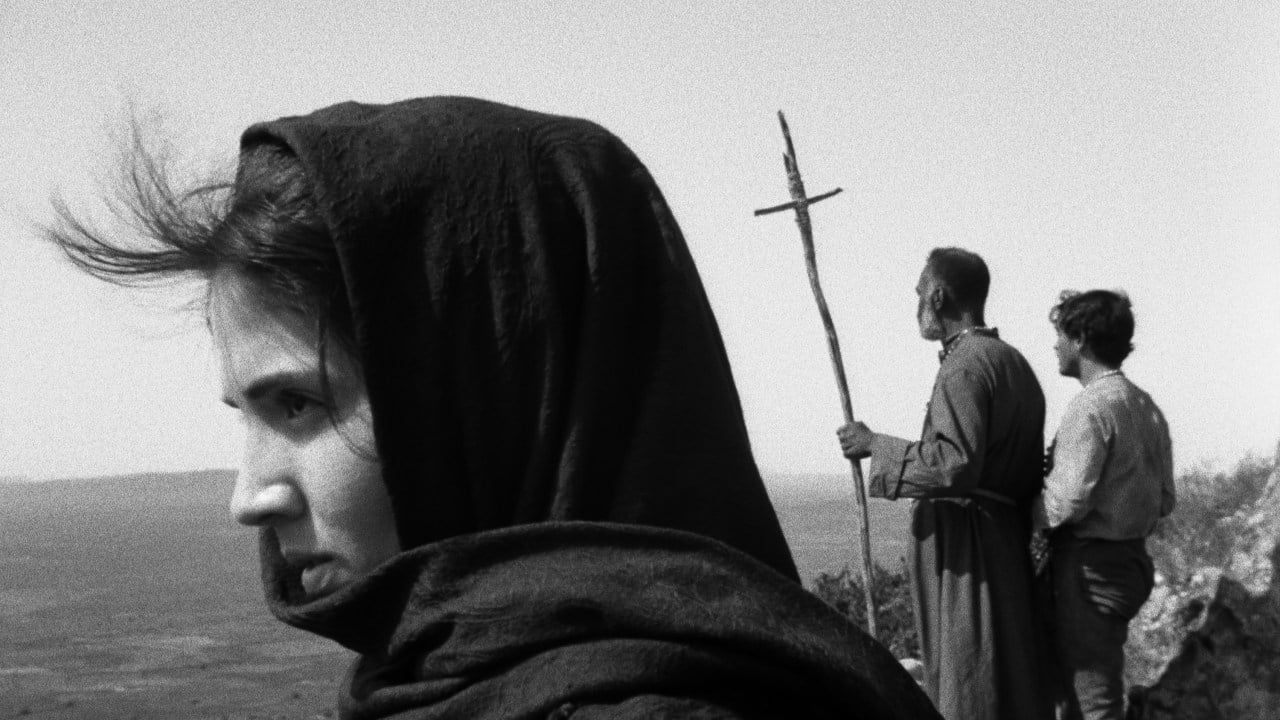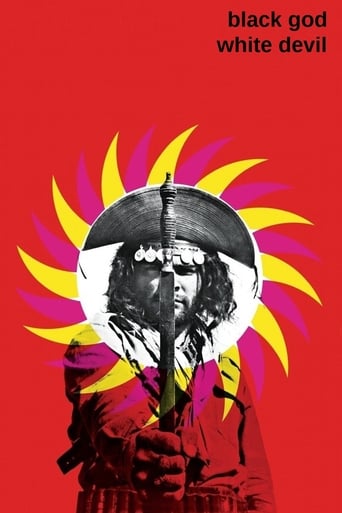

I kept thinking about Black God, White Devil but I couldn't gathered the right thoughts on it at first. For me discovering this film makes clearer the way Brazilian Cinema has become one of the most prolific and true to its own context cinemas in the world. I really believe that once an art manages to emancipate from the chains of the mainstream culture begins an honest art-form that is difficult to evade. I must admit that I had to pause the film in order to get some of the terms used trying to get the most from it. I had issues with the ample of the religious themes, but being from México another country in Latin America that has its history re-written in clerical ink gives me the notion the manner in which catholicism has permeated the Latin American countries' culture, and how was set to control the mind and acts! of the oppressed.The very first shots are overwhelming, we're being forced to grasp the world of the common folk, the amount of work to produce food for a day. To truly know these people's town through their quests, to learn about their struggle with corruption, fake prophets and their search for purpose, or simply a different life. The narrative is quite beautiful put, like a modest parable presents the story of Manoel who after killing his dishonest boss leave his home with Rosa, in his search for peace and justice stumbles upon with two different forces, the first from the "realm of god", a leader who promises a land full of everything the sertão is lacking, but the cost to it includes acts of utter violence; the second one offering to fight the system but with no honor, both asking for blind obedience and servitude. In the middle is Rosa, the voice of reason that we rarely give the credit deserved. The arc of Manoel and Rosa ends just how it began with they leaving behind everything they know, everything we came to know, with nothing but uncertainty about their future. Perhaps that's the commentary Rocha is offering us, that in a putrid system it is no good to trust rigid and tyrannical figures, and sometimes that in which we attribute power is leaving us empty.For me the cinematography felt as a part of the narrative, the overexposed takes are fascinating, the contrast between black and whites makes you feel the rawness of that arid space the characters are into. Perhaps is not a film for everybody not because the author made the effort to distance its oeuvre for a 'type of moviegoers' conceivably it has more to do with how we're used to learn only about our own struggles without reaching beyond the familiar, if you choose to ignore the history of other countries and detach yourself from their struggle surely you'll find this film 'boring', I think is time to learn about each other and be sensible about it.
... View MoreA film that rewards with repeated viewings, I appreciated the review by 'debblyst' which gives a close reading of a film & historical background that can test the patience on its first viewing. It's also clear how this film influenced film-makers like Leone.I loved the setting of the austere desert, almost biblical landscape, harsh, cruel and devoid of water (spirituality, humanity). The film doesn't possess a traditional narrative, but it is basically two lengthy sequences where the lead protagonist, Manuel, and his wife, Rosa, come under the influence of a false prophet and then a psychopathic revolutionary before heading into an uncertain future where a man must listen to his own voice. A film dominated by striking images such as the path up to Monte Santo, the massacre of the Monte Santo innocents & subversive images such as the shadow of Rosa's knife & das Mortes' gun crossing on the wall in an ironic reversal of the Communist symbol.The film is filled with many memorable characters such as the prophet Sebastian & his followers (Bergmanesque hysteria), the vengeful Corisco, the bounty-hunter, das Mortes, & Manoel & his wife Rosa - and the blind minstrel Julio. I also enjoyed the sung musical narration . The most memorable scene for me occurred early in the film: Manoel's vision of Sebastian and his followers. The rest of the film becomes a fable about disillusion, both spiritual & revolutionary. In the film, Manoel becomes entranced first by the mystic, revolutionary fervour of Sebastian, bordering on the hysteric, and then a willing accomplice in Corisco's crimes. Both Sebastian & Corisco manipulate Manuel into committing violent acts: the ritual murder of a child and the brutal emasculation of a young man. Disoriented by his experiences, Manuel can only exclaim: "Is the only way to get justice by shedding blood?"The film is about faith, fanaticism & extremes. In a world where the government & traditional Church suppress the poor, faith and revolutionaries offer hope, but, in turn, descend into extreme behaviour. Antonio das Mortes, the agent of conservative forces, also undertakes a journey of doubt, parallels Manuel.The story reminded me of Gabriel Garcia Marquez's 'One Hundred Years of Solitude' where the revolutionaries turn out to be as violent as the repressive government forces they fight against. 'Black God, White Devil' is probably best regarded as 'heightened cinema' akin to the 'magical realism' of Latin American literature.
... View MoreThis film begins wonderfully, brilliantly shot and keenly acted- but right as you're sure it's coming to a close, the music suddenly runs uptempo and the narrator says the equivalent of "Wait, there's more!" and the second segment of the film destroys any credibility the first might have established. The director's portrayal of the desert's harshness lends logically to the lunacy of the characters- but Rosa's actions in the second half seem completely unmotivated, as if the actors ran out of script and just start making things up out of boredom in front of the camera. Laudable attempts at Eisenstein-style multiple-repeat editing are a good idea but using them to cover the low-budget nature of the action scenes is not. Overall worth seeing, but I must warn you that I fell asleep towards the end.
... View MoreI'm very pleased to comment this picture. It treats about all the hard life of Brazil's northeast population in 60's. Every person should have this knowledge, to understand why Brazil's people are so strong. Even if many people didn't understand, the picture is very realist.It's the fight for life in a place where there is no hope, unless you make justice with your own hands. There is a significant way of showing how poor people survive in extreme conditions of weather. Another thing that it should be said about this wonderful movie is that there is no political structure able to stop life, as it is demonstrated in the scenes of the movie.This is a movie to anyone who wants to have a better idea about real life.
... View More